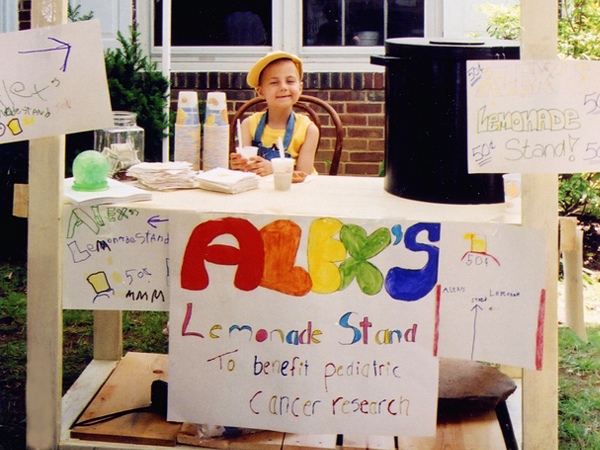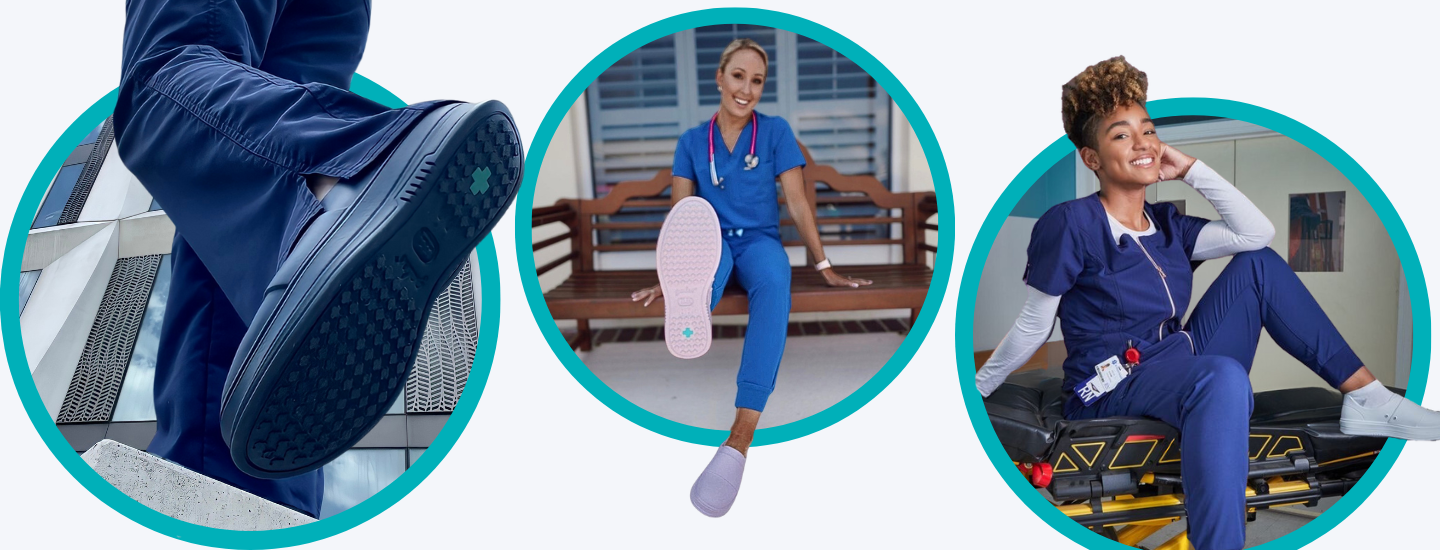
An Interview with Liz Scott of Alex's Lemonade Stand
Last month, Gales® was happy to introduce our latest charitable launch with Alex’s Lemonade Foundation, aiming to bring childhood cancer reaserach to the forefront of federal funding. With a portion of each Gales® x ALSF shoe purchase going directly to the foundation, Gales’® Chief Nursing Officer, Raquél, was happy to sit down with the co-creator (and mother to Alex), Liz Scott to discuss the foundations origins, current work, and future goals.
Hi, Liz! First, I'd like to start off by asking how Alex's Lemonade Stand Foundation came to be, and what brought the foundation to where it is today?
Our organization was started by my daughter Alex in our front yard. Two days before she turned one, Alex was diagnosed with neuroblastoma, a rare childhood cancer. By the time she was almost four years old, all of the known cures had failed. Alex had months and months of chemotherapy, six surgeries to remove her tumors, and radiation therapy. Unfortunately, the treatments did not work. Not only had her cancer come back, it had metastasized to her bones. We were facing what was called an “incurable cancer”. We were told we could take Alex home and enjoy our time, give her time away from the hospital, or try to find new innovative therapies through clinical trials that might give her more time.
We did choose to go the route of clinical trials––we knew that her cancer was causing her a lot of pain and if we could relieve some of that pain, we wanted to; you always hope that you can hit on a cure too. So our family started traveling from Hartford, Connecticut (where we lived) to Philadelphia for this new treatment that was only available in three places: Philadelphia, Michigan, and San Francisco. Alex was the second child to receive this targeted therapy and it was very exciting. When we talked to Alex, we told her that there was a brand new treatment only given to one other child and it might actually help her. When Alex left the hospital, she told us "The treatment worked––I feel better."
It had, in fact, cleared the disease from her bones and she soon went off pain medicine––it was amazing! We knew we had done the right thing for Alex, but more than that, I think it planted the idea in her mind that brand-new treatments existed. Even though Alex wasn't quite four, she had been around cancer a lot in her young life and heard conversations about these exciting new treatments. I tell that story because I think the experience Alex had with innovative therapies and treatments is what shaped the path for Alex's Lemonade Stand.
It was January when Alex first talked about wanting a lemonade stand and we had put the idea off for months and months. One day Alex mentions how we still needed to have her lemonade stand. It was getting hot by then and I asked her why she wanted to run a lemonade stand so badly, thinking she just wanted to buy a Barbie that we could pick up at the store and she said, "I'm not keeping the money. I'm giving it to my doctors so they can help kids the way they helped me."
I think about that phrasing; the idea that her care team had helped her feel better through brand new treatment and she wanted to make sure other kids had the same chances. Alex was a smart little girl. She had been around hospitals her whole life and probably heard conversations about the lack of childhood cancer funding even though it fatally affects more kids than any other disease. Alex thought to herself "I can do something." At first, we told Alex she'd raise five or ten dollars and she said "I don't care, I'll do it anyway." Well, she raised $2,000 that first day! It was life-changing for so many reasons.
We saw how much people wanted to help and the idea that all those little donations could add up to $2,000 really gave her a much bigger goal. Every year after that, Alex would talk about having her lemonade stand. We ended up moving to Philadelphia and her stand took off here, meanwhile, she had three of her best years on experimental treatments.
When Alex was seven going on eight things took a turn for the worst. No treatment was working for her anymore. During that time, Alex became more determined about raising money and she decided she was going to try to raise a million dollars with her last stand.
When we asked her how she could possibly do that with a lemonade stand, she said, "If everyone has lemonade stands or goes to them, I think we can do it." After that, it became a national call to action and by the middle of July 2004, we were able to tell her she was going to reach her goal.
Alex died 10 days later at 8 and a half years old. She created this movement in the meantime, where people from all walks of life, all geographies, and all backgrounds could do something to help solve this problem for kids with cancer and/or contribute to funding research for it. Because of that, we were able to build the organization to where it is today. Starting with lemonade stands and adding many different ways of giving, including great product partners––like Gales®––that are aligned with what we're trying to do to try to solve the problem of childhood cancer. Now, fast forward, we've raised almost $300 million and are one of the largest funders of pediatric cancer research and family services in the country.
Since the start of the foundation, have there been particular areas of research that are supported through ALSF’s funding? Adding onto that, what are the most helpful ways for people to also partake in initiatives?
We are a national funder (and have funded a little bit in Europe and some in Canada) of pediatric cancer research in the US. We believe that a cure found anywhere helps kids everywhere. Having said that, we fund through a competitive grant review process where ten scientific advisors help guide us through the types of requests we want to fund. We get hundreds of applications per year across all of our different types of grants, then we have hundreds of scientists who review the applications and score them. In our process, we're not specific to one type of pediatric cancer. In fact, when we're going through the grant review process, we're always paying attention to especially those less studied pediatric cancers. We've invested in hundreds of young researchers by giving them their first grant; over the years ALSF has been able to fund 150 childhood cancer research hospitals and institutions.
For the second part of your question–– truly still at our heart and soul, we believe that everybody can be a part of curing pediatric cancer. Every donation counts, one cup at a time.
[Since 2004], we’ve had thousands and thousands of lemonade stands every year, then we have our Million Mile event in Childhood Cancer Awareness Month, and we have partnerships with companies. The beauty of our partnerships is that they don't just have one point of engagement. So they might sell something to support us, but also participate in the Million Mile as a company, for example. Lastly, we have some special events which people can volunteer at or attend in person if they want a different way of getting involved. We really let people design their own path of how they want to support.
Speaking of partnerships, that’s a great segue––what made you want to partner with Gales®?
First of all, any company that is looking to work to solve pediatric cancer and seems passionate about it––we just love to work with them. I felt that way from the first time we talked to Rob and got a sense of his energy and enthusiasm for helping people, which is contagious. In the particular case of working with Gales®, the fact that nurses had been the inspiration for the shoes’ creation is so special.
I'll never forget the night Alex was diagnosed. It was just a few hours later, I was sitting in the hospital and my husband went home to be with our other children. Alex was sleeping and everything just came down on me. I mean, I think any parent of a child with cancer can relate to that––the night comes and you sit there with your thoughts. The nurse taking care of Alex came in and I had lost it in my mind, but I was holding it together externally. Alex’s nurse asked me how I was doing and I lost it. I let it all out. I just remember being so grateful for how the nurse handled that situation and how she listened and spent time reassuring me about questions I had. She checked back with me the next night and that was really the beginning of my experience with nurses who took care of Alex because they were also taking care of our whole family. That’s what makes this partnership so very special. Nurses are the ones who are there for the day-to-day of a person’s life.
We’re so grateful and really just excited to be partnering with ALSF because the mission of your organization is so amazing. Our aim with this partnership really is to make people feel supported in the form of our shoes and with the resources that ALSF provides.
And I think it's a cool shoe as well. I love them! I get so many compliments when I wear them.
Check out the Gales® x ALSF partnership!
My last question: out of all the years that you’ve been a foundation, has there been one major accomplishment that you're really proud of?
We know kids are here today, cured and surviving, because of the research our foundation funded. I have to think that's what Alex envisioned when she started selling lemonade. I feel like she lives on in a little way with all those kids out there.
Resources:
TAGS:
SHARE:
